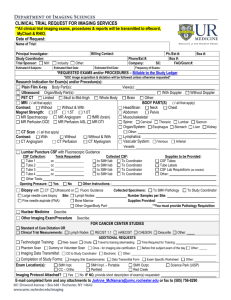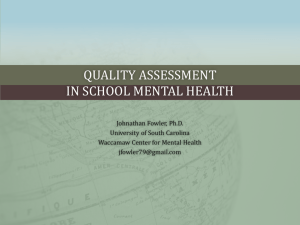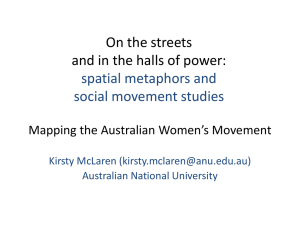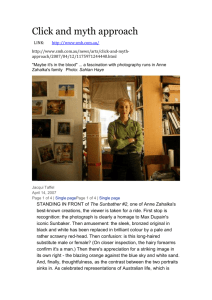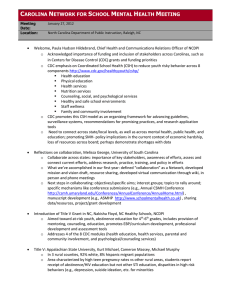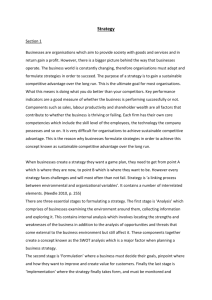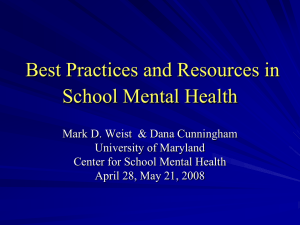St. Michael’s Hospice (North Hampshire) Quality Account 2011-2012
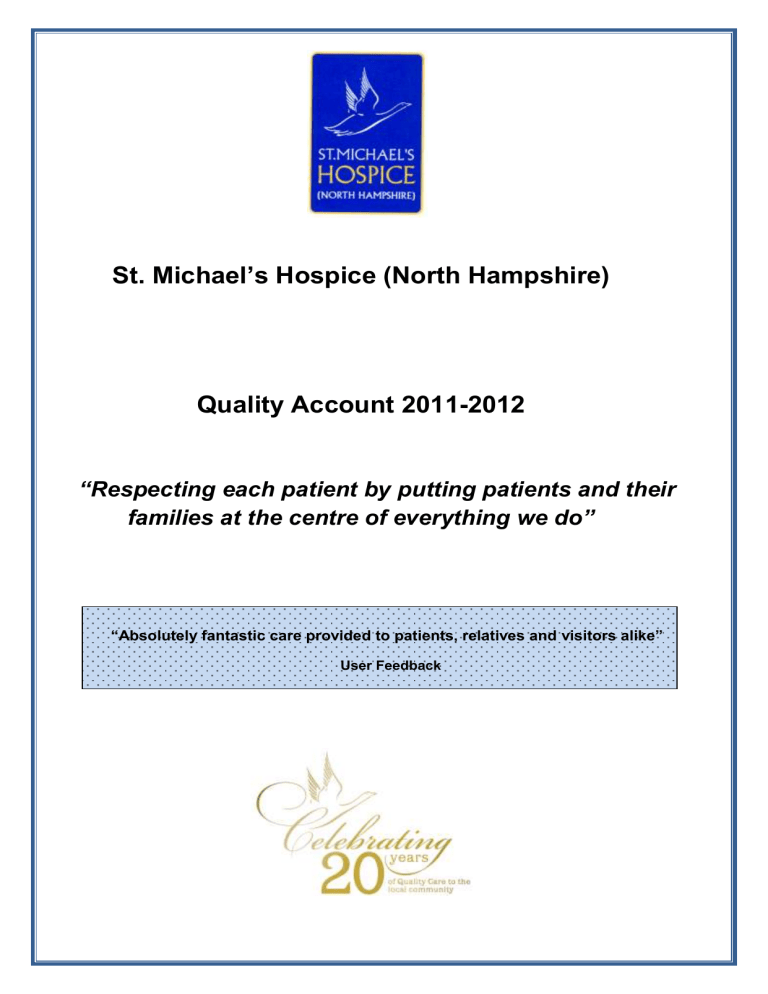
St. Michael’s Hospice (North Hampshire)
Quality Account 2011-2012
“Respecting each patient by putting patients and their families at the centre of everything we do”
“ “Absolutely fantastic care provided to patients, relatives and visitors alike”
User Feedback
CONTENTS
Part 1
Chief Executives Statement
1.1 Priorities for Improvement 2012 -2013
1.2 Priorities for Improvement 2011 -2012
Part 2
Statement of Assurance from the SMH Board
2.1 Review of Services
2.2 Participation in Clinical Audit
2.3 Research
2.4 Quality Improvement and Innovation Agreed with Our Commissioners 8
2.5 What Others Say About Us 8
2.6 Data Quality 8
7
7
7
8
Page
3
4
5
Part 3
Quality Overview
3.1 What Our Patients Say About St Michael’s Hospice
3.2 What our Staff Say About The Organisation
3.3 What our Regulators Say About St Michael’s Hospice
8
15
16
16
3.4 The Board of Trustees Commitment to Quality 16
3.5 Comments from other Stakeholders 16
3.6 References
3.7 SMH Quality Account Feedback
16
17
2
David Monkman
Chief Executive
May 2012
Part 1
Chief Executive’s Statement
St Michael’s hospice has a long and proud tradition of providing high quality palliative and end of life care and support to the people of North Hampshire, to help them to cope with death, dying and bereavement.
Against a very challenging economic climate we have continued to provide and increase our service provision ensuring that care is delivered in the most appropriate setting for patients. To achieve this we have recently enhanced our hospice at home service, established a day case and therapeutic day care programme.
The hospice has in place a published strategy which clearly sets our objectives for the next three years. The strategy will ensure that we continue to provide and develop services which meet the needs of the community we serve. It will ensure that St Michael’s remains pivotal to the provision of palliative and end of life care in North Hampshire and continues to be a leader and innovator.
The hospice is regulated by the Care Quality Commission and has in place robust systems and processes which ensure that high standards of care are maintained with any shortfall being addressed expediently.
None of the above would be possible without the dedication and commitment to the provision of a high quality service by our staff and volunteers.
I am responsible for the preparation of this report and its contents. To the best of my knowledge, the information contained within it is a fair and accurate reflection of the quality of healthcare services provided by St Michael’s hospice.
3
1.1
Priorities for improvement 2012-2013
St. Michael’s Hospice (SMH) is registered with the Care Quality Commission to conduct the following regulated activities as specified in the Health and Social Care Act 2008:
Treatment of disease, disorder or injury
Diagnostic and screening procedures.
The Director for Patient Services for SMH successfully completed the Registered Managers application and registration process and therefore SMH has been assessed as being fully compliant with the Care Quality Commission regulations. It has therefore not been necessary to include any areas of non compliance in the priorities established for improvement for 2012 – 2013.
Future Planning
SMH is committed to ensuring that patients and their families receive leading edge, high quality, evidenced based care. The SMH Board has therefore determined that the top quality improvement priorities for 2012 -2013 will be:
Priority 1: Implementation of the SMH 2011-2014 Strategic Plan
SMH has established an excellent reputation locally for high quality patient care and family support .
Since SMH opened in 1992 the scale and diversity of the services provided by the hospice have expanded substantially. It is intended that in this 20 th
Anniversary year there will be further expansion in the range of services provided to patients and their families by the hospice.
In support of this aim and the need to ensure that SMH services are fit for purpose for the future and are able to respond to the changing and challenging demands of the external environment; the hospice has developed a three year strategic plan.
Underpinned by the key principle of respecting each patient by putting patients at the centre of everything the hospice does, the development of the strategic plan and associated implementation plans included Trustee and staff involvement as well as consultation with a wide range of service users and stakeholders.
A small steering committee has been established to lead the implementation of the strategic plan and lead responsibility for delivering individual elements of the plan have been assigned to designated members of the executive team. Performance against the implementation action plan is being monitored and supported by the SMH Board and Trustees. The SMH Chief Executive provides regular reports outlining progress against the implementation plan milestones at each meeting of the SMH Board .
The majority of the initiatives outlined in the strategic plan are scheduled to come into effect during 2012 -13.
Priority 2: Expansion of the SMH Hospice at Home Service
Working in close partnership with local acute and community NHS and social care agencies, SMH
Hospice at Home Service has played an instrumental role in the successfully piloting and delivery of an integrated fast track end of life service for patients and their families living within the
4
Basingstoke and Deane locality. This particularly related to the availability of the SMH Hospice at
Home night sitting and out of hours on call service.
As a result of this initiative there has been an increase in the number of patients who were supported either to remain at home or be discharged early to have a comfortable and dignified death in their own home, if this was their preferred place of care.
In recognition of the role the SMH Hospice at Home Service played in delivering this initiative,
SMH has been awarded additional funding to support further expansion of the SMH Hospice at
Home Service.
In the first instance SMH intends to increase coverage of the hours of the Hospice at Home service through the introduction of a 7 day rapid response assessment and symptom management twilight service. Recruitment to the posts to support this initiative has commenced.
If further funding should become available over the forthcoming year then the intention will be to expand the rapid response element of the service to also include a weekend daytime service.
These developments will further reduce the need for patients to be admitted or remain in hospital and enable more patients, irrespective of their underlying diagnosis, to be cared for at home at the end of their life if this is their wish.
Delivery of these improvements to the service will be measured against the outcomes determined in the SMH Hospice at Home service specification which are regularly reported to the SMH Board and the Key Performance Indicators agreed with the North Hampshire Clinical Commissioning
Group End of Life Lead.
Priority 3: SMH Clinical Service Review
To ensure patients, carers and families accessing SMH services continue to receive innovative leading edge, evidenced based, high quality clinical care, a fundamental review of the clinical services provided by the hospice was conducted during the latter half of 2011.
Working closely with members of the SMH multi disciplinary team, volunteers, user representatives and key stakeholders, the Medical Director and Director of Patient Services reviewed and developed a new portfolio for SMH clinical services. The SMH Clinical Services
Strategic Framework arising as an outcome of this exercise was approved at a meeting of the SMH
Board in January 2012.
Implementation of the activities / service developments outlined in this framework document has commenced and it is intended that the majority of these initiatives will be implemented over the forthcoming two year period.
1.2 Priorities for Improvement 2011- 2012
St Michaels Hospice was assessed as being fully compliant against the Care Quality Commission’s outcome requirements with the exception of two minor areas for improvement. These were the need to:
Formally appoint a Registered manager
Formulate a register of the SMH medical workforce practices and privileges.
5
A register of the SMH medical workforce practices and privileges was promptly established and continues to be updated on a regular basis.
Following appointment to the Director of Patient Services position in March 2011, a successful application was made by the postholder to the Care Quality Commission for registration as the
Registered Manager.
Full compliance against the Care Quality Commission’s outcome requirements was subsequently awarded.
Improvement Priorities
The key improvement priorities undertaken during 2011- 2012 were:
Priority 1: To improve the internal and external hospice environment
SMH made a successful application to the Department of Health for funding to support improvement to the internal and external hospice environment. As an outcome of this funding it has been possible to:
Upgrade SMH in patient unit facilities including flooring, ensuite facilities and installation of overhead hoists in the patient’s rooms, bathroom and wet room facilities.
Improve SMH in- patient unit relatives facilities through the addition of a conservatory
Build a labyrinth which can be used by patients, carers, families, staff and visitors for quiet reflection to aid their emotional well being.
Refurbish the hospice gardens
Develop a sensory garden
Priority 2: Improve SMH In- Patient Unit bed occupancy
Working with members of the IPU nursing and wider clinical team it has been possible through monitoring and auditing of the in -patient unit admission waiting list and discharge procedures to improve the process and increase bed occupancy from an annual average of 75% recorded during
2009 / 10 to an average of 80.4% during 2010/11 followed by a further increase to 86.5% for the
2011/12 period.
Achievement of this improvement has enabled patients requiring complex or rapid symptom management and / or end of life care to be admitted without delay. Community and acute NHS providers have commented on the improvement they have experienced to this element of SMH services during the past year.
Priority 3: Comprehensive Review of SMH Policies and Procedures
A comprehensive and systematic review of all the policies and procedures governing both clinical and non clinical practice within SMH has been conducted. As an outcome of this review SMH now has (were appropriate) a set of evidenced based policies and procedures that provide measurable robust standards to support aspects of the work of the hospice.
Regular auditing of awareness, knowledge and compliance against these policies and procedures has commenced and will be ongoing over the forthcoming year to ensure that the hospice continues to operate at a high level of safe working practice.
6
Part 2
Statement of assurance from the SMH Board.
This section sets out the list of statements that have been mandated by the Department of Health for inclusion in the quality account, although some of these are not relevant for voluntary service providers.
2.1 Review of services
During 2011 – 2012 SMH provided 9 NHS services:
In Patient Unit
Day Care
Out Patients
Hospice at Home
Complementary Therapy
Physiotherapy
Occupational Therapy
Bereavement Service
Chaplaincy
SMH has reviewed all of the data available to them on the quality of care in these services.
Funding received from the NHS equates to 18% of the cost of providing these services and therefore 100% of the income received from the NHS has been utilised for the purpose of providing these NHS clinical services.
2.2 Participation in Clinical Audit
During 2011 – 2012, no national clinical audits or national confidential enquires were conducted covering the NHS services relating to palliative care.
A list of the number of cases submitted to each audit or enquiry as the percentage of the number of registered cases has therefore not been included in this document.
The reports from fourteen local audits were however reviewed by SMH during 2011-2012.
SMH intends to take the following actions to improve the quality of healthcare provided:
Establish a robust audit, outcome and improvement cycle for all SMH services.
Deliver the agreed annual clinical audit programme
Continue to audit infection control practice through the use of the validated Help the
Hospice audit tool.
Implement a regular survey of patients and carers views on the services provided by SMH.
Develop and implement a robust staff survey
Deliver data to support the Key Performance Indicators agreed with the SMH Executive and
Clinical Teams and North Hampshire Clinical Commissioning Group End of Life Care Lead.
7
2.3 Research
The number of patients receiving NHS services provided by SMH in 2011 – 2012, recruited during that period to participate in research approved by a research ethics committee was zero.
SMH intends to develop the research element of the hospices work and a programme of local ethically approved research will hopefully be initiated during the next two – five year period.
2.4 Quality Improvement and innovation agreed with our commissioners
SMH income in 2011-2012 was not conditional on achieving quality improvement and innovation goals through the Commissioning for Quality and Innovation Payment Framework.
2.5 What others say about us
SMH is required to register with the Care Quality Commission and its current registration status is unconditional.
The Care Quality Commission has not taken enforcement action against SMH in 2011- 2012.
SMH is subject to periodic review by the Care Quality Commission.
SMH has not participated in any special review or investigation by the Care Quality Commission during 2011-2012.
2.6
Data Quality
In accordance with the agreement with the Department of Health, SMH submits a National
Minimum Dataset (MDS) to the National Council for Palliative Care.
Part 3
Quality overview
The National Council for Palliative Care:
Minimum Data Sets for Palliative Care 2010 – 2011
In Patient Unit
% New Patients
% Occupancy
SMH
90.3%
80.4%
National median
89.6%
77.9%
% Availability
Average length of stay – Cancer
Average length of stay - Non Cancer
% Day Case admissions
97.2%
10.3
12.3
0.0%
99.5%
13.0
11.1
0.0%
2008/09 and 2009/10 data identified that SMH was slightly below the national median value for bed occupancy. Following a review of working practices within the SMH In-Patient Unit it was possible to make improvements to deliver a bed occupancy rate of 80.4% for the 2010-2011 reporting period. This has subsequently been improved further to 86.5% for the 2011-12 period
8
which places SMH in the upper quartile when benchmarked against national median levels. In addition SMH has reduced the turn round interval to deliver a score of 2.8 bed days against a national median of 3.2. However SMH still has some improvement to undertake to meet the best practice level recorded for the SHA region of 1.4.
Day Care
% New Patients
% Places used
SMH
60.0%
66.8%
National median
60.8%
56.3%
The number of SMH day care places utilised is above the national median value and the number of new patients referred to the service has improved in comparison to the national median and previous SMH figures. However considerable work is still required to improve SMH’s day care performance against other day care services. Following restructuring of the team supporting SMH day care services and the implementation of revised working practices within the area, it is anticipated that there will be a marked improvement in the delivery of this service to patients and performance against national benchmarks during the forthcoming year.
Outpatients
Number of New Patients
Number of Continuing
Patients
Number of Patients rereferred during the year
Cancer Diagnosis
82
Breakdown not available
0
2010/11
Other Diagnosis
11
Breakdown not available
0
Total
93
30
0
Overall Outpatient Total Breakdown not available Breakdown not available 123
It is difficult to make any assessment of the performance of SMH against Outpatient Minimum
Data Set benchmarked data as many of the patients are seen by SMH’s Palliative Care consultant in joint clinics held in the local acute trust, Hampshire Hospital’s Foundation Trust and this outpatient activity is recorded by the acute trust.
A high proportion of patient reviews conducted by SMH’s medical team are also undertaken as domiciliary visits as many of the patients are too unwell to travel to the hospice for this purpose.
It is hoped that over the forthcoming year changes to the recording of this data may enable more accurate data capture of SMH outpatient activity.
Hospice at Home
Total Number of Patients
% New Patients
% new patients with a non cancer diagnosis
Average length of Care
SMH
248
94.4%
18.8%
17.9
National median
235
91.2%
17.8%
27.0
9
There has been an increase in Hospice at Home activity during the past year and this is reflected in the slightly higher number of patients supported by the SMH service in relation to the national median figure. SMH also continues to record higher levels of new patients and patients with a non cancer diagnosis supported by the service than the national median.
Of note the average length of care is significantly lower than the national median and this is likely to be as an outcome of the strict referral criteria associated with referrals to the SMH Hospice at
Home Service.
Specialist Palliative Care Bereavement Service
Individual counselling sessions
Telephone counselling sessions
Number supported in group sessions
New referrals
Average length of support
2011 -2012
1382
137
111
98
187.3
2010 -2011
1119
149
90
90
154.8
Activity within the SMH Bereavement Service has increased in line with increased SMH Inpatient
Unit and Hospice at Home Service activity. However there has been a focus on individual face to face counselling rather than other forms of counselling support eg group counselling. The average length of support is also much higher in comparison to the national norm. Over the forthcoming year SMH intends to undertake a comprehensive review of the working practices associated with the bereavement service to ascertain the scope for redesigning current service provision.
Chaplaincy
Although separate activity data is not available for this service, as the SMH chaplain works as an integral member of the SMH multidisciplinary team, it was deemed appropriate that reference should be made to the care delivered by this service in this section. The SMH chaplain is involved in all aspects of the hospice and visits all patients. As well as proactively assessing and attempting to meet the complex spiritual and religious needs of patients, their families, visitors and carers.
The chaplain works with all Christian denominations and those of other faiths in discerning and respecting the cultural, spiritual and religious diversity of all patients to ensure their needs are met from a holistic perspective.
The SMH chaplain is also responsible for supporting staff in circumstances that can be very demanding and this support is much appreciated by members of the SMH clinical team.
Therapy Services
The majority of therapy service activity is captured within the service information detailed above.
However as the service provided by the therapy team plays such a critical role in the care delivered to patients and their families, it was deemed appropriate that specific reference should be made to these services in this section.
10
Physiotherapy
Thirty hours of physiotherapy is provided weekly by two therapists to SMH patients.
Physiotherapy is provided as required for in-patients, outpatients, hospice at home patients and those attending day care or the therapeutic programme.
Individual assessments and appropriate physiotherapy treatments are delivered to enable patients to optimise their quality of life.
The physiotherapists work closely with the occupational therapist to facilitate patients achieving their goals and enabling in-patients to be discharged home as soon as possible. Home visits are undertaken as necessary to ensure continuity of patient care.
Occupational Therapy
Currently there is one occupational therapist providing thirty hours service within SMH in-patient unit, day care, hospice at home service and the therapeutic programme. This will soon be increased with the addition of a further 20 hour post to support the increasing activity associated with both the inpatient and the Hospice at Home services. In each clinical area the occupational therapist undertakes a holistic assessment of the person’s abilities and determines their individual priorities as to the tasks they wish to continue to perform. The therapist then provides advice for example on conserving energy and provision of standard and specialist equipment where required. Access to a technician is also available for minor or more major adaptations.
On the in-patient unit the occupational therapist is involved in treatment of patients to enable them to plan with their families any adjustments required to their activities of daily living, thus allowing patients who wish to return home to do so in an effective and timely manner. Several members of the inpatient nursing team have agreed to act as therapy champions to promote ongoing therapy activity in the absence of the occupational therapist. These individuals are receiving appropriate training from the SMH occupational therapist and physiotherapists.
Therapy Assistant
S MH has recently piloted a Therapy Assistant role and following some revisions to the original duties associated with this role, a permanent appointment to this position has recently been made.
Complementary Therapy Sessions 2010 -11 and 2011-12
Out Patients
In Patient Unit
Day Care (including Yoga)
Carers and Other
Bereaved
Home Visits
2010-2011
338
654
473
248
161
125
11
2011 -2012
311
653
731
303
217
129
Therapeutic Clinic
Staff
Total Sessions
66
332
2,397
N/A
254
2,598
As part of the hospices commitment to provide a choice of specialist care and support to patients and their families, SMH offers a range of complementary therapies incorporating: massage including Indian Head Massage, aromatherapy, reflexology, reiki and, Yoga (day care patients only), acupuncture and Bach Flower Remedies. Regular evaluation and audit identifies that these therapies assist some people with relaxation, with symptom control and induce a sense of physical and emotional well being. The service is run by the Complementary Therapy Manager (20 hours a week) and the Senior Complementary Therapist (10 hours) who manage a team of over 20 fully qualified volunteer therapists.
Working in partnership with the Trustees of Odiham Cottage Hospital an outreach service will be offered on a one session basis at Odiham Cottage Hospital over the forthcoming year. This will provide a Complementary Therapy service to patients and their families from the local population who live within the Odiham Cottage Hospital catchment area.
In addition to the quality metrics in the national minimum data set, SMH has also measured performance against the following items. Previous year’s data for some of these items is not available but will be captured on an ongoing basis in the future.
Total number of patients admitted to the In Patient Unit (IPU)
% of patients who went home
Number of bed days
% occupancy
Total number of attendances by patients at Day Care
Total number of Hospice at Home
Visits
Total number of complaints
Total number of serious patient safety incidents (excluding falls)
Slips , trips and falls
Total number of patients known to be infected with MRSA on admission to IPU
Total number of patients infected
2011 -2012
273
41.6%
3,660
86.5%
1042
764
5 (Non IPU)
2 patients collapsed
IPU 38
H@H 1
Day Care 3
0
2010-2011 2009-2010 2008-2009
244 184 170
47.3%
3,549
80.4%
44.3%
3,622
75.0%
40.9%
3,608
71.6%
972
784
0
0
952
632
0
0
1,094
425
0
0
IPU 27
Not Recorded for other services
0
16
0
Not Recorded
Not Recorded
12
with MRSA whilst on IPU
Total number of patients who developed pressure sores whilst on IPU
Length of stay on IPU in days
0
0
10.4
0
0
10.4
0
0
11.7
0
Not Recorded
13.0
SMH is committed to delivering high quality care to patients, carers and families and therefore takes great pride in the fact that:
No patients have become infected with MRSA during their stay on the SMH In- Patient Unit in the past three years.
No patients have been infected with Clostridium Difficile. Both results are in line with the national trend showing reduction of incidence and reporting for these diseases. Hand washing practices and audit of this is also known to reduce incidence.
No patients have developed a significant pressures ulcer whilst on the In- Patient Unit over the past year. Although a patient was admitted with a large pressure ulcer that did not heal before the patient died.
SMH is however not complacent about the need to continue to strive for excellence in care delivery. Measures that could be implemented to reduce the number of slips, trips and falls involving patients in the Inpatient Unit or attending Day Care or the Turner Centre were reviewed.
New anti slip flooring has been installed in the In Patient Unit and a review of the tools available for assessing the falls risk of patients has been undertaken. As an outcome of these exercises, a
Falls Risk Assessment Tool has been identified and will shortly be piloted for use in both the SMH
Inpatient Unit and Day Care services. A Falls Champion whose key role will be to promote falls awareness and act as a specialist resource for colleagues has also been appointed within the SMH
Inpatient Unit Nursing Team.
All complaints to SMH are now centrally logged by the Senior Nurse for Quality and Clinical
Governance and therefore are reported within this Quality Account document. This is a change in practice as previously non clinical complaints were not logged on the clinical complaints database.
Five complaints were received by the hospice over the past year although none of these related to the quality of care delivered to patients. However one did relate to the difficulties encountered by a carer knowing which number to use to contact the Hospice at Home Out of Hours Service. A revised system has subsequently been implemented to make it clear to new users of the service which number they should use to make contact with the Hospice at Home Out of hours nurse on call.
The remaining four complaints related to non clinical elements of the service. All complaints were fully investigated and complainants received a letter from the SMH Chief Executive outlining the action that had been taken in relation to their complaint.
SMH actively seeks patients / users views on the services. During 2011 – 2012 a formal satisfaction survey was conducted for user’s accessing SMH Inpatient, Day Care and Hospice at Home Service.
The Small is Beautiful campaign, originally conducted in 2010, was also repeated over a three
13
month period during 2011. Overall satisfaction with the services provided by SMH has remained very high.
A wide variety of suggestions/ comments were received as a result of these initiatives, ranging from comments on elements of the service patients really appreciated or believed could be improved to comments on improvements that could be made to the facilities/ environment.
All of the recommendations received have subsequently been incorporated into present or future service development or facilities/ environment improvements plans.
As SMH is committed to consulting widely with patients and their families about the improvements that can be made to SMH clinical services or the development of services they would wish to see provided in the future, a number of focus groups involving a wide range of different individuals e.g. patients, carers, students, public and visitors are planned over the forthcoming year.
The first of these focus groups involving carers was held at the end of April 2012 and the information/ recommendations arising from this group are being incorporated into a draft action plan which will be circulated to the carers who attended the meeting for their comment.
The carers focus group members have kindly agreed to act as critical friends and have given an undertaken that they will comment/ advise on and monitor implementation of the activities / initiatives associated with the action plan once a finalised version of the plan is available.
Participation in clinical audit
SMH has adopted a process of continuous service improvement to ensure that patients, carers and families receive the highest quality of care delivery. Auditing of the clinical services forms an essential element of this monitoring process.
An annual clinical audit programme was submitted and ratified at the October 2011 meeting of the SMH Clinical Governance Committee. To date all the audits outlined within this programme have been conducted and reported on schedule.
These audits include:
General and controlled drugs management and storage .
Accountable Officer annual controlled drugs audit
Effectiveness of Complementary Therapy survey
Quality of Nursing documentation
DNACPR form internal audit and submission of data to regional audit
Infection control
In Patient Unit patients meal interruptions
Out of Hours calls to the SMH in patient unit and Hospice at Home service
Referral response times
Admission delays/ bed occupancy
Discharge planning
Falls Audit
Waste audit
14
Submission of data to the national lung cancer audit
Nationally validated audit tools eg Help the Hospice have been utilised where these exist for the items to be audited.
In light of work that has been published from other services relating to the:
Use of Primary Thromboprophylaxis in the Palliative Care Setting originally undertaken by the Pan Birmingham Cancer Network.
Prescribing of Breakthrough / Rescue Opioid Analgesia, multi centre audit across 10 trusts in the South.
It was agreed that practice within SMH should be evaluated against the audit tools used for these studies. As an outcome of these audits within SMH:
A validated guideline for Primary Thromboprophylaxis in a Hospice Inpatient Setting has been produced and implemented into practice within SMH.
SMH drug prescription charts format has been revised to support best practice breakthrough / rescue opioid analgesia prescribing within SMH.
Information, recommendations and changes to practice arising from all the audits undertaken to date have been communicated to relevant personnel through a variety of communication mediums including face to face feedback, team meetings, display and circulation of audit findings.
In addition the outcome and recommendations arising from all the audits undertaken for clinical services are reported via SMH’s clinical governance meeting and reporting structure to the SMH
Board. Through membership and interrogation of the audit results at clinical governance meetings and unannounced inspection of SMH services, Board members are also able to monitor and report their findings/ observations directly to the Board. The SMH Board is able to receive assurance regarding the quality of service delivery via this system.
As SMH wishes to be at the forefront of evidence based care delivery it is intended that over the forthcoming year the audit programme for SMH clinical services will continue to include best practice audits in addition to the regular audits undertaken to monitor SMH service standards.
3.1 W hat our patients say about St. Michael’s Hospice
Detailed below are some of the comments that have been received from patients, carers or family members over the past year either through letters or the Small is Beautiful campaign.
“I had almost given up on the human race, but now after all the kindness and consideration in here, and the cheerfulness my faith is restored. Thank you to all nursing staff, doctors and volunteers”.
“The empathy, care and kindness to all of us is so appreciated”.
“You made a difficult time a little easier with your compassion”
“Absolutely fantastic care provided to patients, relatives and visitors alike”
Feedback from the Small is Beautiful campaign has subsequently been utilised to inform future service provision and development.
15
3.2 What our staff say about the organisation
A formal staff survey has not been conducted during the last year, although it is intended that this will occur during the next twelve month period.
However, as a result of staff comments received via the Small is Beautiful campaign and feedback from away day sessions, several initiatives have been taken forward including:
Introduction of a rolling clinical education programme and electronic education calendar.
Establishment of robust communication channels to provide and receive feedback via regular team meetings, display of meeting minutes and emailed communication to designated email addresses.
Overall staff indicated that they found the hospice environment supportive and from a clinical supervision perspective, they valued the opportunity to participate in clinical supervision.
3.3 What our regulators say about St. Michael’s Hospice
SMH applied and received registration with the Care Quality Commission in accordance with the requirements of the Health and Social Care Act 2008. The evidence submitted as part of the registration process was considered sufficient to enable the Care Quality Commission to approve unconditional registration status for SMH.
3.4 The Board of Trustees Commitment to Quality.
The Board are fully committed and supportive of the provision of a high quality clinical service which they see as the prime role of the organisation. The hospice has in place a governance structure with Board members represented on appropriate committees.
Formal Board meetings are held every quarter and the Board receives reports from the Chief
Executive and all senior managers both clinical and non clinical.
The Chair and Vice Chair meet with the Chief Executive on a monthly basis and part of the standing agenda includes discussions around the quality of care.
Board members are actively involved in various aspects of the running of the hospice.
All the above ensure that the Board have a “real feel” for the level of care provided. The Board are confident that the care and treatment of patients is safe, cost effective and of a high standard.
3.5 Comments from other Stakeholders
It is a requirement that this Quality Account is circulated to various stakeholders in order that they have an opportunity to comment on it prior to its publication.
This document was circulated to Hampshire Primary Care Trust, North Hampshire Clinical
Commissioning Group and the Local Involvement Networks [ LINks]. No comments were received from these organisations.
3.6 References
Health and Social Care Act 2008: DH July 2008
Essential Standards of Quality and Safety: Care Quality Commission March 2010
16
3.7 SMH Quality Account Feedback
If you would like to comment on the content or format of the SMH Quality Account for 2011-
2012, then please submit your comments either via the SMH website or to the SMH Chief
Executive at this address:
St Michael’s Hospice (North Hampshire)
Basil de Ferranti House
Aldermaston Road
Basingstoke
Hampshire
RG24 9NB
17

